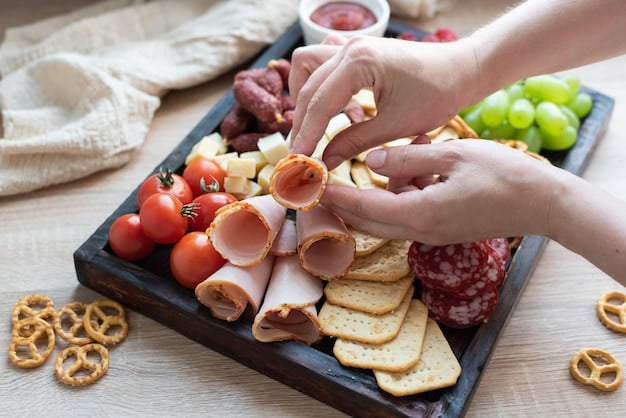
Pregnancy is a time of joy and anticipation, but it also comes with a list of dos and don’ts, particularly when it comes to food. One delicacy that often raises questions for expectant mothers is charcuterie. In this article, we will explore the world of pregnancy-safe charcuterie and provide insights into making this indulgence a part of your pregnancy diet without compromising your health or your baby’s well-being.
Contents
What is Charcuterie?
Before delving into the topic of pregnancy-safe charcuterie, it’s essential to understand what charcuterie is. Charcuterie is a French term that encompasses a variety of preserved and cured meats, such as salami, prosciutto, pâté, and sausages. These meats are often served on a platter alongside cheeses, fruits, nuts, and condiments, creating a delightful and flavorful spread.
Charcuterie and Pregnancy
Nutritional Benefits
Charcuterie can be a source of various essential nutrients during pregnancy. Many cured meats are rich in protein, which is crucial for the development of your baby’s organs, muscles, and tissues. Additionally, charcuterie often contains vitamins and minerals, including B vitamins, iron, and zinc, which can support your overall health during pregnancy.
Potential Risks
While charcuterie offers nutritional benefits, it also carries potential risks. One of the primary concerns is the risk of foodborne illnesses, such as listeriosis. Listeria, a bacterium that can be found in some cured meats, can be harmful to both the mother and the baby. Therefore, it’s crucial to make informed choices when enjoying charcuterie during pregnancy.
Safe Charcuterie Options for Pregnant Women
If you’re an expectant mother and craving charcuterie, there are safe options available. Opt for dry-cured or salted charcuterie, such as prosciutto, as these types of meats are less likely to harbor harmful bacteria. Heat-treated charcuterie, like cooked sausages, can also be a safer choice, as the heat kills any potential pathogens.
Homemade Charcuterie Tips
Creating your own pregnancy-safe charcuterie platter at home allows you to have better control over the ingredients. When preparing homemade charcuterie, choose high-quality, pasteurized cheeses and pair them with fresh fruits and vegetables for a nutritious and safe indulgence.
Charcuterie Ingredients to Avoid during Pregnancy
While enjoying charcuterie during pregnancy is possible, it’s essential to avoid certain ingredients that may pose risks. Skip raw or undercooked meats, unpasteurized cheeses, and any charcuterie products that have been stored improperly. These precautions will help minimize the risk of foodborne illnesses.
Conclusion
In conclusion, pregnancy-safe charcuterie can be a delightful addition to your diet, provided you make informed choices. While charcuterie offers valuable nutrients, it’s essential to be aware of potential risks, particularly the risk of foodborne illnesses like listeriosis. By opting for safe charcuterie options, considering homemade alternatives, and avoiding risky ingredients, you can enjoy this delicacy during your pregnancy while ensuring the safety of both you and your baby.
FAQs
1. Can I eat prosciutto during pregnancy?
- Yes, prosciutto is considered safe for pregnant women when it’s dry-cured and properly stored.
2. Are all cheeses safe to include in pregnancy-safe charcuterie?
- No, unpasteurized cheeses should be avoided during pregnancy. Stick to pasteurized options.
3. How can I ensure the safety of charcuterie products I purchase?
- Always buy charcuterie from reputable sources and ensure it is properly stored and refrigerated.
4. What are the common symptoms of listeriosis, and how can I recognize them?
- Listeriosis symptoms include fever, muscle aches, and gastrointestinal issues. If you experience these symptoms, consult your healthcare provider.
5. Can I include charcuterie in my pregnancy cravings in moderation?
- Yes, with the right choices and precautions, you can enjoy charcuterie in moderation during pregnancy.




